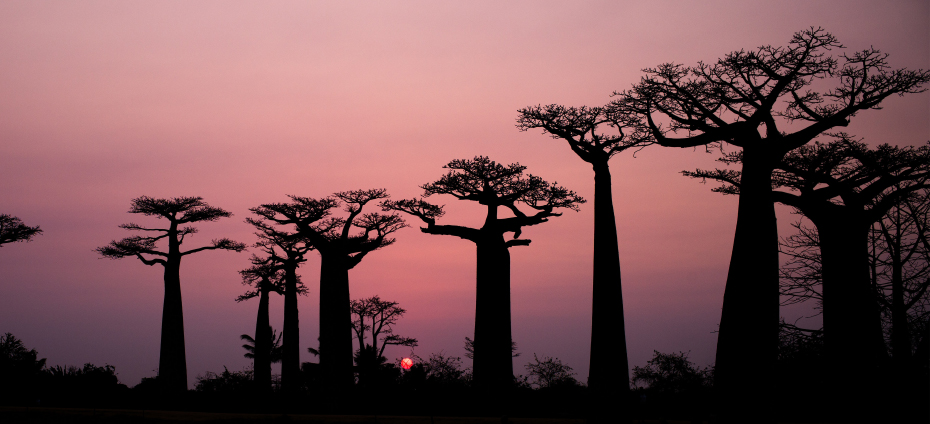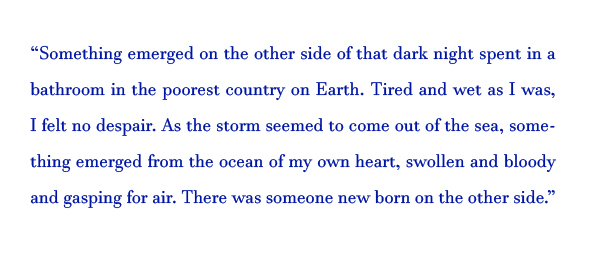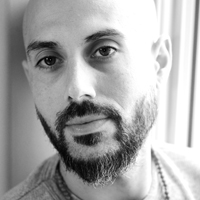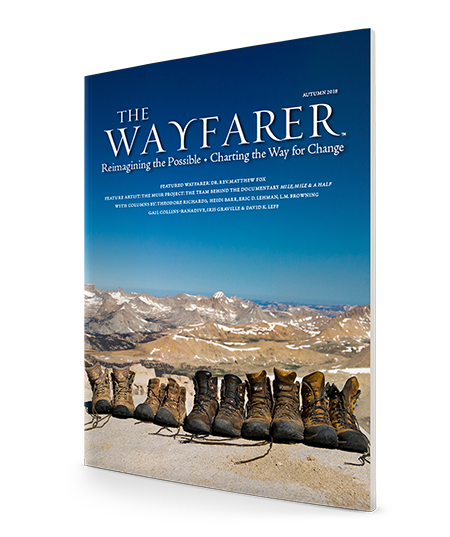
During the second to last week I worked in Zimbabwe the price of bread tripled overnight. There were strikes and riots in the cities. Mugabe was condemned by the West. The West was condemned by Mugabe. In the bush, the earth cracked in the dry air as the sun continued to beam down, day after rainless day. The Baobab trees were unmoved.
It is likely that most of the mountain people of the borderland area between Zimbabwe and Mozambique have never seen the sea. The thing is, it really isn’t that far. That’s the privilege I have: I can cross borders, travel distances that may have taken generations for my ancestors. Or at least would only have been traversed in one direction—a migrant is a very different thing from a tourist. I wasn’t exactly a tourist in those days. I’d been an aid worker, teaching the women of the eastern highlands of Zimbabwe how to do basic math and reading in English. Now I was headed to the beach.
“What is your question?” said the man on the back of the flatbed truck as he gave me a guava. It was an odd turn of phrase; perhaps his English was not so good and he’d meant something else. After all, even on the other side of the border, the English speaking side, most did not speak much English. Here, on the Mozambican side, I figured most spoke Portuguese, perhaps Shona and some other African languages, but not English.
“What do you mean?” I asked, squinting into the wind and sun as we raced down from the mountains into the flatlands.
His English was good. “You are coming a long way,” he said, passing me another guava. “You do not look like a business man or a refugee. You must be trying to answer some question.”
I bit into the guava and tossed the skin off the truck and onto the high grass the bordered the sorry road. I tasted its sensuous dance of sweet and sour, the texture of its crunchy seeds and soft flesh. There were other tastes and textures, too, and I tasted them: wind blowing through my long hair, the smell of burning garbage, the joy of the road. I was alive. The answer to his question was there—or, rather, the question—but I could not articulate it. We smiled at each other, sharing the fruit of the poorest country in the world, racing through the bush, to the sea, saying nothing.
I arrived in Beira to expectant smiles. This was the poorest country on Earth, not very far removed from a disastrous civil war that had stretched out beyond years and into generations. I was grabbed quickly by a smiling cabby. “Where do you go?”
“Bique’s.”
“Ah yes,” he said, smiling broadly. “I know this place. This is a good place.”He shoved me into the backseat of a dilapidated old car and said something incomprehensible to the driver. Apparently, in Mozambique, driving a taxi was a two-person job. Before he even gotten in the car, his partner started the engine. It sputtered weakly. He shouted something again and began to push, the door still open. Again the engine sputtered. Finally it started, and before it had taken off, the man leapt into the front seat of the slowly accelerating car. None of this particularly surprised me; I’d watched, for many months, the acrobatics of bus conductors as they sang their destination and jumped in and out of their moving buses. We were off.
We left the area of the Beira bus station and headed north, through the kind of scenery one might expect near the sea: tall grass, salty air, wind blowing. For a moment, I wondered if the men would actually take me to my destination, if this wouldn’t be some sort of robbery attempt. I’d been robbed a couple of times before. But it was a brief moment. I was young. And, you see, the risk was worth it. I was answering my question, that inarticulated and unknown question that I could, at that moment, only could be answered in Beira, Mozambique.
Finally, we reached the place. I thanked the men and gave them a wad of Metacais—worth only pennies but enough that they seemed pleased. I entered an incredibly modern-looking bar, equipped with satellite television and a view of the beach. For a few dollars I could pitch my tent on the beach next to the bar; I could use their bathrooms and drink their liquor and cappuccino. White sands stretched out across a vast and empty and clean beach dotted with fishermen and boys playing soccer. The ocean shone in a bright blue against slightly lighter and cloudless sky. The world cup played on the satellite television: Zidane was working his magic for a French team filled with Africans. Here, in the poorest country in the world, I had found paradise.
As the days passed, a few friends, fellow aid workers, joined me in Beira. This was a different time: we’d communicated through letters, vague addresses scratched on pieces of paper. But they’d found me.
We spent our days on the beach and wandering through the old town. The streets, twisted and nameless, were at once splendorous in their colonial architecture and desperate in their barrenness. We entered an old theater that had been converted into a restaurant; on market days we bought cashews from old Indian women as the men sipped coffee in the square; squatters had moved into a luxurious old hotel and grew fruit trees on the roof.
I jogged along the beach each morning, passing by the occasional shipwreck along with boys playing football—future Zidanes or, perhaps, Eusebios—and the fishermen pushing their boats out to sea. The port, too, was filled with shipwrecks, “Welcome to Atlantic City” scrawled on the side of one.
I returned to the sea and watched, eating coconuts and swimming in the ocean. In the evenings a few locals came to the beach bar to watch the world cup, but mostly there were other travelers—white Zimbabweans and South Africans, plus a few aid workers like us. After living in the bush for so long, I enjoyed watching Zidane and drinking espresso.
There was an inkling of something happening in those days that we’d only begun to understand. Globalization was a word that had been spoken of a lot in the Clinton administration, but we didn’t really understand what it meant yet, didn’t understand the perilous and shrinking world in which we all lived.There was also something awakening in me in those days. I’d gotten a taste of the backpacker scene as a college student in Spain and in the hostels in Harare. I wanted to go. I wanted to go and not stop. To feel the sensation of the wind in my hair as in that flatbed. I was in Mozambique, at the edge of the world. Whatever my question was, I could only ask it here.The problem was that, in a shrinking world, there were so few edges. Only centers. No questions. Only answers.

As the days passed, my aid-worker friends left. I was there alone again—eating coconuts and watching the sea. On my last night there, I emerged from the bar to find that it was raining. It had been the dry season; and it had been so long since I’d seen even a rain cloud I hadn’t even considered the possibility. My ragged little tent, which I’d borrowed from a friend and had no rain flap, was filling with water.
The bar was closed, so I tried to sleep in the wet tent. I quickly gave up and retreated with whatever dry possessions I could gather into the only dry place I could find—the bathroom.
As bathrooms go—particularly bathrooms in impoverished, war-ravaged countries—this one was actually remarkably clean and bright. But it was no place to sleep, and I quickly abandoned the idea.
I took out my journal and began to write. This was nothing new. I’d been writing every day for months about my travels, my encounters, my thoughts and feelings about the new world I was encountering both beyond me and within my own heart. But on that night, I did something different. I began to write a story.
Something emerged on the other side of that dark night spent in a bathroom in the poorest country on Earth. Tired and wet as I was, I felt no despair. As the storm seemed to come out of the sea, something emerged from the ocean of my own heart, swollen and bloody and gasping for air. There was someone new born on the other side.
But I had many miles to go. I still didn’t even know what my question was, much less have an answer for it. I knew only that I had reached that particular moment through a confluence of stories. And I had to listen to them clearly. I had to find them; I knew that there was a story in which I was participating, one that I had to go out into the world to embrace and uncover to even comprehend who I might be; and I knew that there was a story I needed to tell.
Many years later, I would learn that when something was being born, it was my job to catch it.
***
“You’re gonna have to catch the baby!”
My wife’s voice was loud and strained, with a hint of panic. I continued to fumble with the showerhead. Moments before, when she’d realized she was in labor, she’d asked me to attach the hose to the showerhead in order to fill the birthing tub while we waited for the midwife. Our third daughter, Vismaya, whom we’d never expected, was a planned homebirth; but the plan was to have a team of midwives present.
I fumbled some more. There are things I am good at, things that don’t particularly faze me. Plumbing and anything that has to do with taking things apart and putting them back together are not on that list. I let out a sigh of relief. I much preferred to catch a baby than reconfigure the plumbing.
My wife was letting out sounds that had grown increasingly, desperately, primal as Cosima, the oldest, now seven, came into the bathroom. We’d welcomed her participation in the birth, but she looked a little scared. It was the sounds her mother was making. “You don’t have to stay,” I said. She went back to her room, got under the covers, and waited for her sister to arrive.
I washed my hands. It seemed like the thing to do. Seemed medical.
“I don’t think I can do this!” my wife exclaimed, voice cracking just a bit. She must have been thinking some inarticulated version of this: The midwife isn’t here and I am left in the hands of a man who can’t unscrew a showerhead, who can’t even turn on the television without me. This is why women used to die in childbirth in the 1800s. And I did always joke that, without my wife, our home is like the 1800s, so limited are my technical capabilities.
But there was nothing technical, or even medical, about this birth. I looked her in the eye. “You can do this,” I said. “You’ve done this before.” Like this was what we’d been waiting to do since that day, so many years ago, on the porch: to give birth. Like this was the rhyme she’d been waiting to spit but couldn’t quite find the words until now.
She focused on pushing. I felt beneath where she squatted. Drops of blood fell over my hands, then more. Then the head. The head is the hardest part, the most painful part, as anyone knows who has given birth or witnessed a birth. It is the uniquely human part of the process; our big heads contain the minds that contain universes, from the cave paintings to Coltrane. We think we are different merely because our big heads make us smarter. But the human baby is born earlier, less developed, than it should be. Any longer a gestation period and the head would never get through. So we don’t get up running like zebras.
Those who have witnessed birth know this, too: The human baby is utterly dependent. Because of the abbreviated gestation, required by our big heads, we are biologically required to love our babies. We are only human because we can create community and care for one another. Our big heads can write symphonies; but they can also create nuclear bombs. Care is just as important as innovation.
The head came out, and along with it a deluge of liquids. I held the little body as it slid out into my arms, bloody and gasping for air. Like her parents. Like the whole world into which she’d come.
You’ve done this before.
My wife sat on the toilet and put the child to her breast. We cried at the bloody and awesome beauty. She was our beautiful, cosmic surprise. I had caught her, our unexpected third daughter.
This is how the universe works: We didn’t know that we’d have three daughters, but the world is unimaginable without each of them. There is a perfection in this, a thing to listen to in the world. Their days are spent in a maelstrom of creative energy, creating, imagining, making worlds. Three girls. This is something in itself to listen to.
When I close my eyes, I see those drops of blood on my hands, like the raindrops falling into my hands on the Mozambican beach. To live in this world is to have blood on your hands, to be alive is to have the courage not to turn away, because something is being birthed out of the bloody mess.
I caught her. Perhaps, one day, when I fall and fail in countless ways, she will catch me, too.

Theodore Richards
Staff Writer and Editor
Theodore Richards is a philosopher, poet, and novelist. As the founder of The Chicago Wisdom Project, editor of the online magazine Re-imagining: Education, Culture, World, and a board member of Homebound Publications, his work is dedicated to re-imagining education and creating new narratives about our place in the world. He is the author of seven books and numerous literary awards, including two Nautilus Book Awards and two Independent Publisher Awards. His next book, A Letter to My Daughters: Remembering the Lost Dimension & the Texture of Life, is released on October 9th, 2018 from Little Bound Books. He lives in Chicago with his wife and daughters.
This is a selection from The Wayfarer’s Autumn 2018 issue.
Order the entire issue in either print or e-edition in our store.
The Wayfarer is a biannual magazine released in print and e-edition every spring and autumn. We publish a high-quality journal of literature and art that inspires and points the way for visionary-yet-practical change. By our definition, a “wayfarer” is a wanderer whose ability to re-imagine the possible provides the compass bearings for those on their way. The Wayfarer’s mission is to chart the way for change by building and empowering a community of contemplative voices. We seek to release a publication that builds and empowers a community of contemplative voices and serves as an agent for cultural transformation.
Subscribe to the Print Edition • Subscribe to the e-edition • Browse Featured Articles
To bring each issue of The Wayfarer to fruition, it takes hundreds of hours each season to craft, edit, design, and distribute the journal. If you find joy and enrichment within our features, please consider becoming a supporter with a small donation. There is no set amount. Whether it is .99 or a few dollars, we appreciate any gift you care to give. While at this time we are not a non-profit all donations do go towards ensuring the future of the journal.
Help us Empower Change by Giving a Little Change!
![]()


